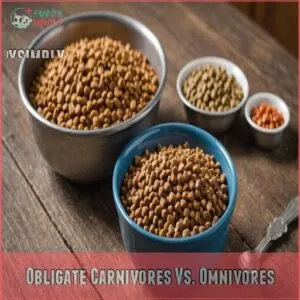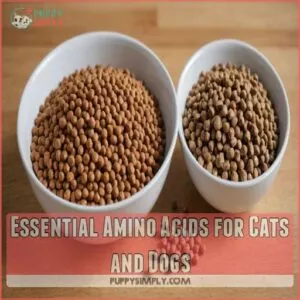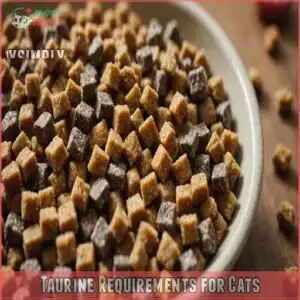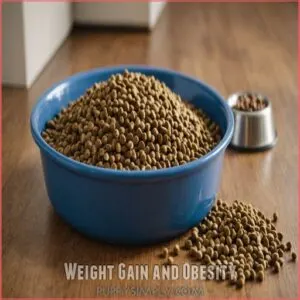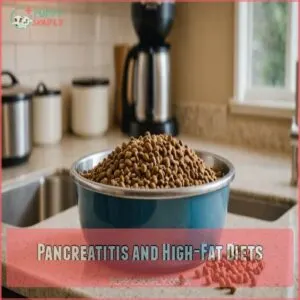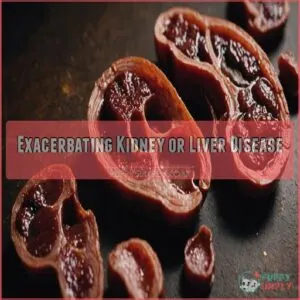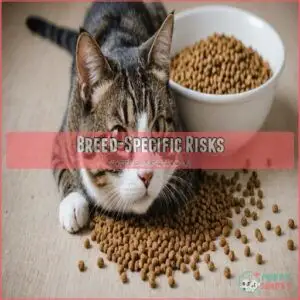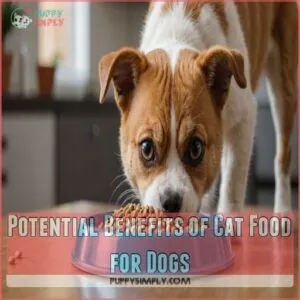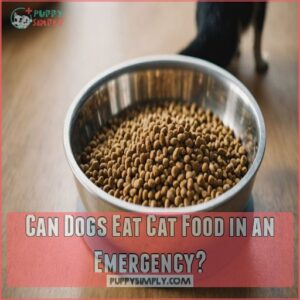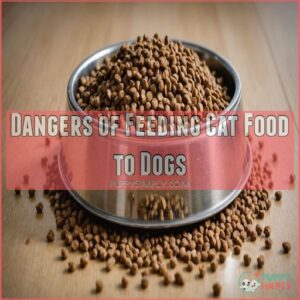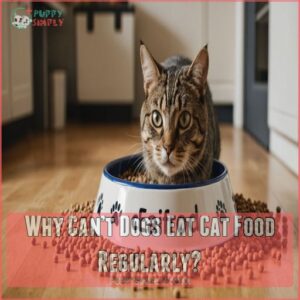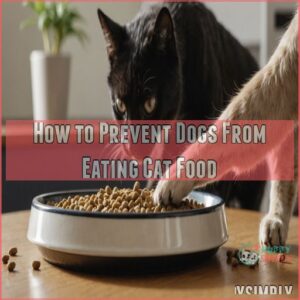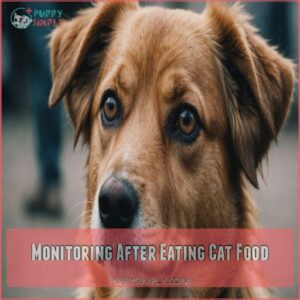This site is supported by our readers. We may earn a commission, at no cost to you, if you purchase through links.
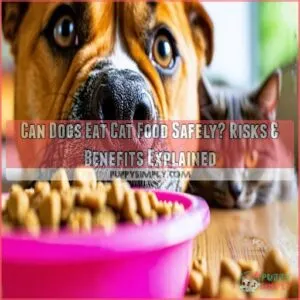
Cat food packs a protein and fat punch that might upset your dog’s tummy and mess up their nutritional needs.
Dogs digest food differently because, unlike their feline friends, they’re not obligate carnivores.
So, if your pooch sneaks a nibble from the cat’s bowl, keep an eye out for any unusual symptoms, and don’t let it become a regular treat.
Think of cat food as a candy bar—good for a rare indulgence but definitely not dinner.
Stay tuned to learn how to keep your pets from sharing meals!
Table Of Contents
- Key Takeaways
- Nutritional Differences Between Cats and Dogs
- Risks of Feeding Cat Food to Dogs
- Potential Benefits of Cat Food for Dogs
- Can Dogs Eat Cat Food in an Emergency?
- Dangers of Feeding Cat Food to Dogs
- Why Can’t Dogs Eat Cat Food Regularly?
- How to Prevent Dogs From Eating Cat Food
- Monitoring After Eating Cat Food
- Frequently Asked Questions (FAQs)
- Can dogs eat cat food?
- Is cat food bad for dogs?
- Can dogs survive on cat food?
- Can dogs eat cat treats?
- What can happen if a dog eats cat food?
- What cat food is safe for dogs?
- Why does my dog prefer cat food?
- Is it okay to give cat food to a dog?
- Can cat food affect a dogs behavior?
- How often can dogs eat cat food?
- Is cat food harmful to puppies?
- Can cat food be used as dog treats?
- Are there any safe cat food ingredients for dogs?
- Conclusion
Key Takeaways
- While your dog can safely eat cat food occasionally, it’s not suitable for regular consumption due to its high protein and fat content, which can lead to weight gain and health issues.
- You should keep cat food out of your dog’s reach and feed your pets in separate locations to prevent your dog from sneaking bites of cat food.
- If your dog eats cat food, watch for signs of illness like vomiting, diarrhea, or lethargy, and consult your vet if symptoms persist.
- Stick to dog-specific food and treats to meet your pup’s unique nutritional needs and maintain their long-term health.
Nutritional Differences Between Cats and Dogs
You’ll quickly notice cats and dogs have very different dietary needs: cats are obligate carnivores, craving high-protein meals, while dogs can thrive on both plant and meat-based diets.
Despite their shared love for treats, a bit like how you might enjoy both chocolate cake and salads, their nutritional requirements aren’t interchangeable.
Obligate Carnivores Vs. Omnivores
Ever wonder why your cat’s food looks so different from your dog’s?
It’s all about their evolutionary diets.
Cats are obligate carnivores; their bodies are built to thrive on meat.
Dogs, however, are omnivores, happily munching on both meat and plants.
This difference in food sources directly impacts their digestive systems and protein requirements.
Understanding these basic dietary needs is key to keeping your furry friends healthy and happy.
Essential Amino Acids for Cats and Dogs
Understanding why cats and dogs need different diets matters, starting with amino acids.
Cats rely on meat for amino acids they can’t produce themselves.
Dogs, though, can source theirs from both animal and plant-based foods.
This amino acid difference emphasizes how cats absolutely require certain supplements.
Feeding them the same things just might lead to some nutritional no-nos.
Taurine Requirements for Cats
For cats, taurine is a vital nutrient.
Unlike dogs, cats can’t produce this essential amino acid on their own.
Taurine deficiency symptoms can be severe, affecting their hearts, eyes, and more.
Luckily, cat food taurine levels are designed to keep your kitty purring with health.
Thinking about taurine supplements for cats?
Always talk to your vet to make sure your feline’s needs are met.
Risks of Feeding Cat Food to Dogs
Feeding your dog cat food might seem like a quick fix, but it can lead to health issues like weight gain, pancreatitis, or even exacerbating kidney or liver disease.
Some breeds are particularly at risk, so it’s best to keep Fido strictly on dog chow.
Weight Gain and Obesity
Feeding dogs cat food can tip the scales, leading to weight gain and obesity because it’s high in protein and fat. A diet rich in essential fatty acids and enzymes, like those found in raw dog food diets, can improve skin and coat health, but cat food is not a suitable substitute.
You see, maintaining a healthy weight involves giving your dog balanced nutrition.
Different breeds have varying caloric needs, and understanding canine caloric intake is important to prevent weight gain.
- Watch portions: Don’t overfeed.
- Exercise regularly: Keep them active.
- Consistent meals: Stick to dog food.
- Veterinary advice: Consult a vet if unsure.
Pancreatitis and High-Fat Diets
You might think your dog has a cast-iron stomach, but cat food’s high-fat content can trigger pancreatitis, a painful condition, especially in dogs prone to it.
Breeds like Cocker Spaniels and Miniature Schnauzers are more vulnerable.
Here’s how fat content weighs in:
| Dog Breed | Risk Level | Action Step |
|---|---|---|
| Cocker Spaniel | High | Monitor food intake |
| Miniature Schnauzer | Very High | Consult veterinarian |
| General Breeds | Moderate | Keep cat food out of reach |
Exacerbating Kidney or Liver Disease
Think high-fat diets are tough on a dog’s pancreas? They can also spell trouble for kidneys and liver.
Cat food’s protein overload stresses these organs, making daily meals risky if your dog has kidney disease or liver concerns.
It’s like giving a car premium gas when it requires regular.
Consult your vet for personalized dietary advice—your dog’s health craves it.
Breed-Specific Risks
Certain breeds, like Miniature Schnauzers and Cocker Spaniels, are more prone to pancreatitis.
To manage pancreatitis, you need to choose the right Pancreatitis dog food.
This means they’re extra sensitive to high-fat diets, a common feature in cat food.
So, while a tiny taste mightn’t hurt, regular cat food could cause serious health problems for these pups.
Always check with your vet before switching up your dog’s diet, especially if they’ve any pre-existing conditions.
Their health is your top priority!
Potential Benefits of Cat Food for Dogs
You might be surprised to learn that cat food can sometimes benefit dogs, especially if they’re underweight or have a poor appetite.
While some dogs might benefit from calorie-dense diets, such as those offered by dog food for weight gain, to help them gain weight. While it’s not a long-term solution, high-protein cat food can entice picky eaters or help sick pups gain weight, but always consult your vet first.
Weight Gain for Underweight Dogs
Got a skinny pup? Cat food’s high protein and fat can help with weight gain strategies when your dog’s underweight.
The rich diet might appeal to picky eaters, but it’s not a long-term solution.
Always lean on vet recommendations—adjust diets carefully, focusing on balanced food choices.
It’s essential to maintain health without overdoing it on feline treats!
Temporary Solution for Poor Appetite
When your dog turns into a picky eater, cat food might be tempting to stimulate their appetite.
It’s like offering a rich dessert to someone who’s lost their taste for dinner.
However, this isn’t a long-term fix.
Think of it as a temporary solution for appetite loss while you figure out the root cause.
Always consult your vet for weight management advice.
Shared Pet Treats for Both Species
If your dog’s appetite is picky, shared treats might be the ticket.
These treats are popular because they cater to both cats and dogs, making snack time a breeze and a bit of a hoot.
Just keep an eye on ingredient safety and potential allergies—different brands cater to diverse taste preferences, adding flavor to your pet’s day.
Can Dogs Eat Cat Food in an Emergency?
In a pinch, you might wonder if your dog could safely nibble on your cat’s food.
While it’s generally not ideal, feeding your dog cat food occasionally, like in an emergency, typically won’t cause immediate harm, but it’s wise to consult a vet and keep an eye out for any adverse reactions.
Consulting a Veterinarian
Before letting your dog indulge in cat food during an emergency, tapping into veterinary advice is key.
Vets know the ins and outs—dietary concerns, food sensitivities, and breed-specific needs.
They might even crack a smile while weighing health risks.
Think of them as your dietary GPS, guiding you through a maze of kibble choices.
Trust them; you’re in safe hands!
Monitoring for Adverse Effects
After talking to your vet, keep a close eye on your dog, especially if you’re using cat food as a substitute due to a shortage of their regular dog food ingredients.
Watch for digestive upset, like diarrhea or vomiting.
Note any weight changes, shifts in energy levels, or changes in their coat.
Behavioral changes can also be a red flag.
Don’t hesitate to call your vet if you see anything unusual—better safe than sorry!
Dangers of Feeding Cat Food to Dogs
Feeding your dog cat food might seem harmless, but it can lead to serious health issues due to its high-protein, high-fat content.
Dogs risk becoming overweight, facing nutrient imbalances, and developing conditions like pancreatitis if they regularly munch on their feline friend’s meals.
High-Protein and High-Fat Content
Think of cat food as a tempting treat for your dog – like cookies instead of dinner.
The high-protein and high-fat content might sound like a muscle-building dream, but:
- Weight gain sneaks up quickly.
- Kidney health can suffer with excess protein.
- Pancreatitis risk rises with fatty foods.
- Energy levels can spike unpredictably.
It’s best to avoid tempting fate.
Nutrient Imbalances
Feeding your dog cat food might sound harmless, but nutrient imbalances lurk beneath the surface.
Protein overload and fat imbalance can upset your dog’s diet, while mineral ratios and vitamin discrepancies might disrupt their health more than you’d expect.
Cats need taurine in a way dogs don’t, which leaves your pup missing essential elements specific to their needs.
Potential Health Consequences
- Kidney issues due to excess protein.
- Liver problems stemming from imbalanced nutrients.
- Pancreatitis risk because of high fat content.
- Urinary tract issues and nutritional deficiencies leading to long-term trouble.
Talk about a dog’s dinner, huh?
Why Can’t Dogs Eat Cat Food Regularly?
You might think it’s cute when your dog sneaks a bite from the cat’s bowl, but making this a habit can lead to trouble.
Dogs and cats have different nutritional needs, so feeding Fido like Fluffy could throw a wrench in their health.
Species-Specific Dietary Needs
Dogs and cats have different nutritional needs.
Cat food ingredients are loaded with protein and fat, great for cats but risky for dogs, leading to potential nutritional deficiencies.
You’ve probably noticed dogs aren’t as picky—thanks to their omnivore nature.
Dog food ingredients, on the other hand, often prioritize high-quality protein sources like chicken, beef, lamb, and fish, similar to those found in a German Shepherd raw food diet, balance meat and plants for ideal canine health, avoiding digestive differences or food allergies.
Evolutionary Differences
Millions of years of evolution shaped their different diets. Cats’ bodies are built for a meat-heavy menu, while dogs’ are more flexible.
Think of it like this:
- Cats are expert hunters, built for chasing and killing prey.
- Dogs are scavengers, happy with a mix of meat and plants.
Their gut bacteria differ wildly, reflecting their different diets, which is why cat food’s high protein content can be problematic for dogs.
Dietary Adaptations are key to their health and well-being.
Ignoring these differences can cause problems.
How to Prevent Dogs From Eating Cat Food
Keeping your dog from gobbling up your cat’s food can be a challenge, but there are simple strategies to try.
Feeding your pets in separate locations or using secure containers safeguards meals but also helps maintain your pets’ unique nutritional needs.
Feeding in Separate Locations
Imagine this: juggling dinner for two without a spill.
By feeding your pets in separate areas, you maintain order at mealtime.
It helps prevent dog food raids on cat bowls and keeps feeding schedules intact.
With cat food stored away from canine snouts, you’ll create a harmonious dining experience.
Think of it as their own exclusive dining club.
Using Secure Containers
You’ve tried feeding them separately, but that sneaky pup still finds a way to munch on kitty’s kibble.
Consider using durable containers to stash cat food safely.
Opt for secure feeding bowls with lids or bins that prevent theft by curious canines.
Choose container sizes that fit your space, and make sure they’re sealed tight.
It’s like placing a treasure chest out of reach!
Supervising Feeding Times
Supervising feeding times is key to keeping your dog from gobbling up cat food. Try these steps:
- Establish clear mealtime routines to minimize chaos and food aggression, and consider addressing food aggression in stages if your dog exhibits any signs of aggression around food, such as growling and teeth baring.
- Keep cat food storage high and secure to deter curious canines.
- Make sure dog and cat food locations are separate, giving you better control over who’s eating what—even the sneakiest pups can!
Monitoring After Eating Cat Food
After your dog sneaks a taste of cat food, it’s important to keep an eye out for any signs of tummy trouble or unexpected behavior.
While the occasional nibble might seem harmless, making adjustments to their diet and consulting your vet can help make sure your furry friend stays healthy and happy.
Watching for Signs of Illness
Sometimes, you might notice signs of illness like vomiting, diarrhea, or lethargy in your dog after sneaking some cat food.
If your dog’s appetite loss persists, it may be necessary to entice a sick dog to eat.
Keep an eye on any appetite changes or unexpected weight loss, as these can signal trouble.
It’s important to stay alert and monitor their behavior closely.
If these symptoms persist, consulting your vet should be your next step.
Adjusting Diet and Feeding Habits
Notice any unusual symptoms?
If your dog ate cat food, keep a close eye on them.
Adjust their diet gradually by incorporating their regular food from trusted dog food brands like those found at top dog food.
Here’s how:
- Start with smaller portions of their regular dog food.
- Space out their meals, avoiding overfeeding.
- Consider safer treat alternatives like carrots or green beans.
Don’t worry, we’ll sort out the best long-term plan soon!
Determining The Best Dietary Options
Choosing the best dietary options for your dog feels like picking the perfect playlist for a road trip.
Consider dog food brands rich in nutrients or homemade diets, especially those featuring novel protein diets or limited ingredient diets, which are great options for dogs with food allergies as explained in natural dog food for allergies. Consider dog food brands rich in nutrients or homemade diets if allergies are an issue.
Focus on weight management and pre-existing conditions.
Combine a balanced diet with regular vet check-ups to keep your furry friend healthy and happy.
Addressing Specific Health Concerns
You’ve figured out the best diet, but keep an eye on those specific health needs! Watch for changes:
- Kidney health: Monitor for excessive thirst or urination.
- Pancreatitis risk: Look out for vomiting or diarrhea.
- Breed-specific needs: Know your dog’s quirks—small dogs might need extra attention.
Regular vet check-ups are your safety net, offering peace of mind!
Frequently Asked Questions (FAQs)
Can dogs eat cat food?
Feeding your dog cat food can stir a hornet’s nest.
It’s high in protein and fat, which can lead to weight gain, pancreatitis, or worsen existing conditions.
Stick to dog food to keep your furry friend healthy.
Is cat food bad for dogs?
Cat food isn’t ideal for dogs.
It’s too high in protein and fat, potentially leading to weight gain or pancreatitis.
Keep dog diets balanced for their needs.
For safety and health, consult your vet for advice.
Can dogs survive on cat food?
Like trying to fit a square peg in a round hole, dogs can’t thrive solely on cat food.
It lacks the nutrients they need, potentially causing health problems.
Stick to dog food for their well-being!
Can dogs eat cat treats?
Your dog might enjoy the occasional cat treat, but it’s not ideal regularly.
Cat treats have different nutritional content that can upset your dog’s diet balance.
Check with your vet for the best snack options.
What can happen if a dog eats cat food?
Did you know that 33% of dogs sneak cat food regularly?
If your pup indulges, they might face weight gain, pancreatitis, or digestive issues.
High protein and fat content in cat food is similar to a Dachshund raw dog food diet that can be customized to meet a dog’s specific nutritional needs, enhanced by raw diets. High protein and fat content in cat food can upset your dog’s balanced diet.
What cat food is safe for dogs?
No cat food is truly safe for dogs.
While occasional nibbles won’t harm, it’s not balanced for canine needs.
Stick to dog-specific food to avoid health risks like weight gain or pancreatitis.
Your pup’s tummy will thank you!
Why does my dog prefer cat food?
Dogs often prefer cat food due to its higher protein and fat content, making it tastier.
It’s like choosing a burger over a salad.
While tempting, it’s not a balanced diet for your pup’s needs.
Is it okay to give cat food to a dog?
Like a kid sneaking cookies, your pup might love cat chow, but it’s not a wise choice.
While an occasional nibble won’t hurt, regularly feeding your dog cat food can lead to health issues.
Stick to dog-specific meals.
Can cat food affect a dogs behavior?
Cat food can indeed influence your dog’s behavior.
You might notice increased excitement or aggression during mealtime.
The high protein and fat content could lead to hyperactivity or restlessness.
It’s best to stick with dog-specific food for balanced behavior.
How often can dogs eat cat food?
It’s best not to make cat food a regular part of your dog’s diet.
You shouldn’t feed it more than once or twice a month, if at all.
Stick to dog-specific food for your pup’s health and happiness.
Is cat food harmful to puppies?
Imagine this: Your curious pup sniffs out the cat’s bowl.
You’re worried, but don’t panic!
While cat food isn’t ideal for puppies, occasional nibbles aren’t typically harmful.
Still, stick to puppy-specific food for their growing needs.
Can cat food be used as dog treats?
While it’s tempting, using cat food as dog treats isn’t recommended.
It’s not balanced for your pup’s needs and can lead to health issues.
Stick to treats made specifically for dogs to keep your furry friend happy and healthy.
Are there any safe cat food ingredients for dogs?
Imagine a dog’s digestive system as a picky gatekeeper.
While some cat food ingredients are safe for dogs, like chicken or fish, it’s best to stick to dog-specific foods.
They’re formulated to meet your pup’s unique nutritional needs.
Conclusion
Feeding Fido feline food frequently? Think twice.
While a poodle’s diet, such as a poodle raw dog food diet, can significantly improve their overall health, dogs can eat cat food safely in small amounts, it’s not ideal for their long-term health.
The high protein and fat content can lead to weight gain and digestive issues.
Remember, your pup’s nutritional needs differ from your kitty’s.
Stick to dog-specific diets to keep your canine companion healthy and happy.
If your dog sneaks a bite of cat chow, don’t panic – but do watch for any unusual symptoms.
When in doubt, always consult your vet.

